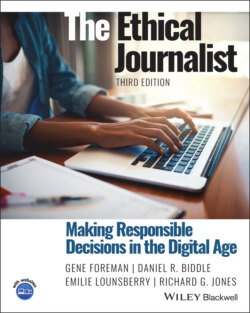Читать книгу The Ethical Journalist - Gene Foreman - Страница 47
Decades of Rising Professionalism
ОглавлениеThe journalism of the twenty‐first century reflects the reforms that occurred over more than a half‐century of rising professionalism.
Journalists are better educated. A journalist without a college degree is a rarity in newsrooms today. According to a 2013 survey of journalists by the Indiana University School of Journalism, 92 percent have at least a bachelor’s degree. 43 Although possessing a diploma does not automatically make someone a better journalist, the rising education level signifies better preparation for the challenges of a complex profession.
Newsrooms have diversified. Diversity in the news staffs is reflected in news coverage that is more likely to examine the whole community. The journalists of the mid‐twentieth century, nearly all white men, tended to write for people like themselves. The profession has been influenced by the women and people of color who entered the workforce in the second half of the twentieth century. The transition remains a work in progress, however.
Journalists have accepted a duty to be accountable to the public. A news organization’s social responsibility is to provide honest, impartial, and reliable information about current events that their fellow citizens need to make democratic institutions work. This responsibility entails being responsive to questions and complaints from the audience – the readers, viewers, listeners, and online users. It means a commitment to the principle of transparency, a spirit of openness, one that acknowledges journalists’ mistakes and explains news decisions rather than arrogantly asserting that the decisions speak for themselves. The internet has made accountability more important than ever, for two reasons: first, citizens form an army of fact‐checkers calling attention to journalists’ mistakes, and, second, the web’s interactivity fosters a conversation between journalists and the audience.
Journalists have embraced compassion. Where many journalists of the mid‐century liked to project an image of toughness toward the people they covered, today’s journalists generally show empathy. They are concerned not just with reporting the news but also with how their reporting will affect the people involved. “Minimizing harm” is one of the four cornerstone principles of the Society of Professional Journalists’ code of ethics and is, as well, a key component of a course in journalism ethics.
“Watchdog” journalism has flourished. Journalists, especially through investigative reporting, use their platform to expose wrongdoing and to illuminate solutions to public ills. When the government’s democratic system of checks and balances breaks down, journalists have stepped in to investigate and report to the public on the system failure. In February 2007, for example, Dana Priest, Anne Hull, and Michel du Cille of The Washington Post documented neglect by Walter Reed Army Medical Center in caring for outpatients – soldiers and marines who had been physically and psychologically damaged in the wars in Iraq and Afghanistan. Congress and the White House immediately responded by promising sweeping reforms and by firing the officials who they thought should have prevented the failure. Although officials and the citizenry do not always respond so forcefully, that has not deterred responsible journalists from continuing to try to raise the public conscience when they discover civic dysfunction.
